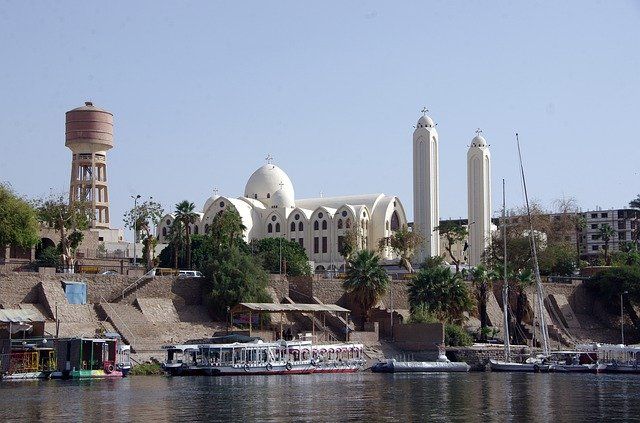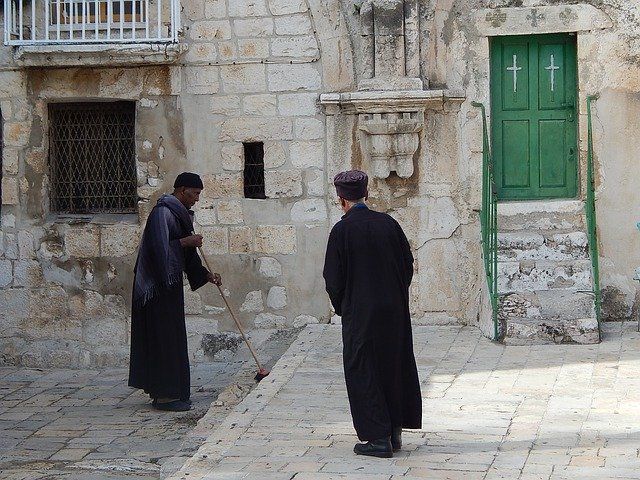
During the second half of the nineteenth century the Lord used the efforts of Bible-believing, Reformed missionaries to disciple tens of thousands of Coptic people and scores of Muslims. This led to the establishment of vibrant Reformed congregations throughout the country.
The missionaries realised that they must train pastors, evangelists, elders, deacons and others. This training of an indigenous leadership for the growing churches proved prudent and effective. Today, the Reformed community in Egypt is not only the largest Bible-believing community in the entire Mediterranean region, but also plays an active role in evangelism, church planting and teaching throughout the Arabic speaking world.
Coptic believers
The nineteenth century saw a Bible-oriented movement take root within the Egyptian Coptic Church. The Coptic leadership exploited that interest and encouraged the formation of Coptic Bible study groups. As a consequence, several societies were organised in major Egyptian cities to help Coptic Orthodox Christians study the Bible on a regular basis. One of the best known of these is ‘The Society of Christ’s Soldiers’. This movement led to the emergence of Coptic lay preachers and the use of the Arabic language in Coptic worship.

Until about 1990 the Coptic Evangelical movement was estimated to number over two million people. In recent years, because of divisions over charismatic issues and internal scandals, many have reverted to the ‘protection’ of mother church. Others have broken away to join the many Evangelical denominations or small, charismatic house-church groups.
In the early fifties, Coptic Christians with a keen interest in evangelism established an independent, non-denominational organisation called ‘The Society for the Salvation of Souls’. They determined to proclaim a simple gospel message. Very quickly, they had a big impact on thousands of Coptic church members who liked the freshness of their simple message and wanted to remain loyal to their church.
Avoiding doctrinal issues, however, proved impossible, especially since this society relied on itinerant evangelists identified with one denomination or another. Today the society is smaller and is run by people from different churches (including Coptic and Reformed). It also publishes devotional materials translated from English. Although most of these are Arminian and pietistic, works by Spurgeon, Whitefield, Jonathan Edwards and other Reformed writers have been published.

Indigenous church
After the enforced transfer of Palestine to Jewish control at the close of World War II, a strong pan-Arab movement took hold of the Middle East. For many Arabs this embodied the best hope of gaining independence from the old colonial powers and of restoring Palestine to Arab control.
One by one, the Arab nations gained independence from British, French or Italian rule. Since foreign missionaries were viewed as importers of a ‘foreign religion’, the Coptic Church leadership was just as keen to see them removed from the country as were their new nationalist rulers.
So freedom to operate in Egypt ended for foreign Evangelical missionaries by the mid-1950s. However, this apparent set-back proved a blessing in disguise, for three reasons. Firstly, it shielded the Egyptian Reformed churches from the liberal theology that was then influencing many younger missionaries.
Secondly, it challenged national churches to take on full responsibility for caring for their own people. Thirdly, local churches, separated from foreign support, were viewed by the population as authentically Egyptian. Today, the Lord uses faithful Egyptian pastors, evangelists and others to evangelise and instruct their own people.
Persecution complex
Like other minorities, Egyptian Evangelical and Reformed Christians can suffer from a persecution complex. One must never underestimate the immense pressures of living in an oppressive Muslim atmosphere.
Egyptian Christians are exposed to pressures that the average westerner does not face. Corrupt government officials, bribery, dishonesty in the workplace, and religious hypocrisy, are all common problems. The culture is dominated by a non-Christian world-view (most of the laws that apply to Muslim citizens affect local Christians too).
There is unfair discrimination over jobs and promotion. Moreover, Christians are constantly bombarded in the media by verbal attacks on their beliefs, but are given little public opportunity to defend those beliefs. They also feel the pressure of being identified with the moral and social decadence of the ‘Christian’ West.
Yet one must not exaggerate the degree of persecution they suffer. There are no laws officially persecuting Christians in Egypt. Evangelical Christians tend to be more educated and better off than many, and are generally more ambitious and hard-working.
While Christians who are not self-employed are expected to work on Sundays, they are also free to hold public worship services early on Sunday mornings or on Sunday evenings.
Egyptian Christians often complain of difficulty in obtaining building or repair permits for church premises. Yet, they admit that many of the church buildings that already exist are not being used to full capacity. In the larger Cairo area alone, Reformed Christians have access to more than fifty licensed church facilities.
Opportunities
Even though the law does not allow public evangelistic campaigns, churches and Christian societies are able to proclaim the gospel within the walls of duly licensed facilities and the privacy of their homes. Moreover, wise and prudent Christians always have quiet opportunities to bear witness to Muslim colleagues, neighbours and friends. Regardless of their religious bias, thoughtful Muslims usually admire and respect Christian values and are impressed by those who live a consistent Christian life.
It is important for Christian media not to be carried away by stories of persecution in Egypt. It is more important to emphasise the positive blessings that Egyptian Christians enjoy. Readers should give thanks for these blessings and pray that Egyptian Christians will make the most of the many opportunities they have to live for Christ and witness to him.
Using the media
It is the Lord who controls and directs events in human history for the ultimate purpose of gathering his elect people from among the nations. Even though much wrong is propagated by printed materials, and over the radio, TV and Internet, it is clear that the Lord is using these advances in technology to bring the gospel message to millions of Muslims.
Two to three million Egyptian Muslims listen to Radio Monte Carlo’s newscasts and secular programmes. It is estimated that one third of them also listen to the gospel broadcasts aired late every evening. This is confirmed by the volume of letters received in response to these broadcasts. Tens of trained Egyptian believers eagerly follow up the serious listeners who write in.
Tens of thousands of Bibles, Bible portions and evangelistic tracts are made available to Egyptian Muslims every year. In recent years, Egyptians from all walks of life have become much more open to reading Christian materials than in the past. Thousands purchase them at Cairo’s famous annual book fair.
The Arabic Bible, and some of MERF’s gospel broadcasts, are now available over the Internet. Muslim browsers can listen to, read or even download such materials in the privacy of their own homes, even in a closed country like Saudi Arabia.
Unnecessary obstacles
One of the most serious mistakes committed by the church in Egypt (and other parts of the Muslim and Arab world) has been the unnecessary isolation of converts. Most of the Arabic names that Christians once identified as ‘Muslim’ were actually used by Arab Christians prior to the advance of Islam and were meaningful Semitic names! Insisting on Muslim converts adopting a ‘Christian name’, as missionaries and Arab church leaders once did, has created unnecessary offence and stirred up the families and communities of converts to persecute them.
On the other hand, Egyptian Christians can be too suspicious of converts from Islam. They can dismiss them as spies or (if they are young male converts) as only interested in having a Christian woman.
Even though there have been encouraging changes in the outlook of Egyptian pastors and other Christian leaders, the majority of believing Egyptians are still wary of trusting Muslim converts as genuine brothers and sisters in Christ.
Regaining acceptance
Converts from Islam to Christ are usually initially threatened and rejected by their Muslim contemporaries. Providing them with loving care and wise counsel is essential to enable them to remain in a country like Egypt and gradually regain the acceptance and love of their families.
It is most important for them to be counselled not to speak gratuitously against their former religion and not to offend their families or communities unnecessarily by open defiance. Initially, the testimony of a changed gracious life goes a long way towards gaining the sympathies of those upset by their conversion.
We can give thanks to the Lord that in recent years Egypt has become a more open society for the dissemination of the gospel, and that the church is eager to provide responsible care for the growing number of converts.
We all need to be more prayerful and more spiritually prepared for the great spiritual awakening that the Lord may yet have in store for Egyptian and other Arab people (cf. Isaiah 19:19-25; Acts 2:10; Ephesians 1:10-12).









